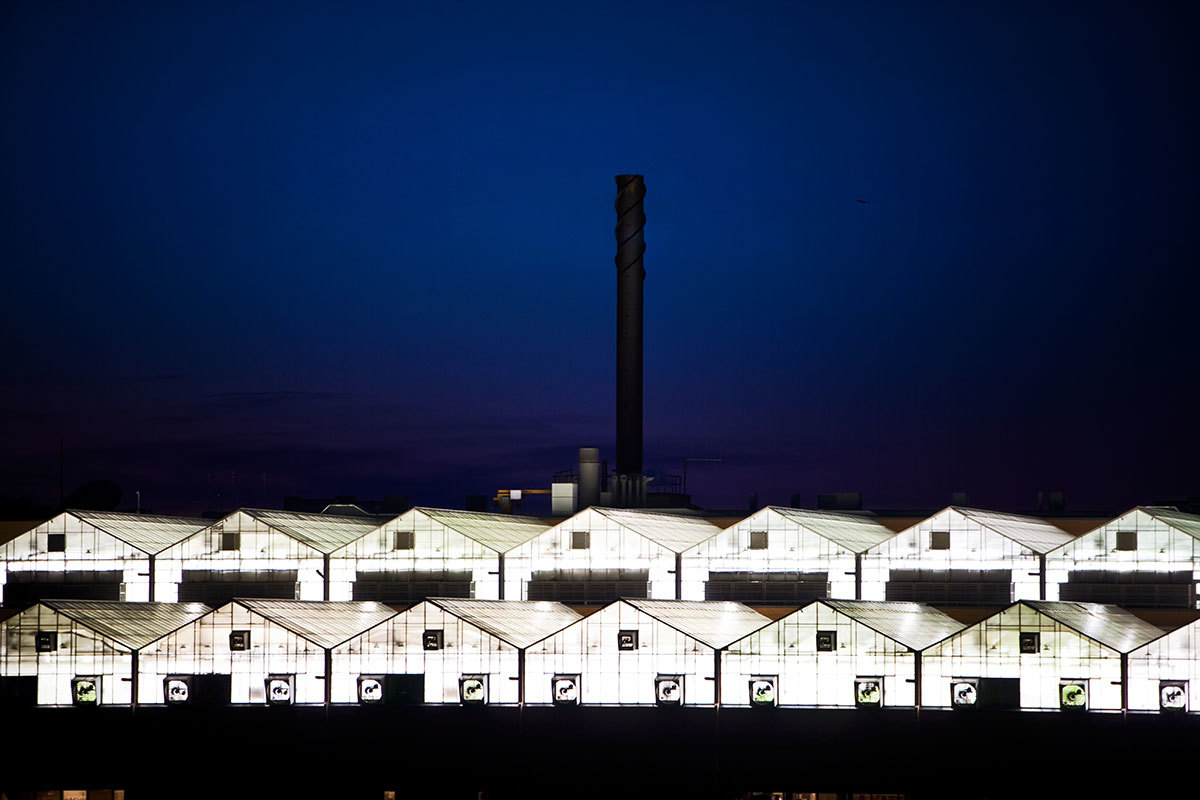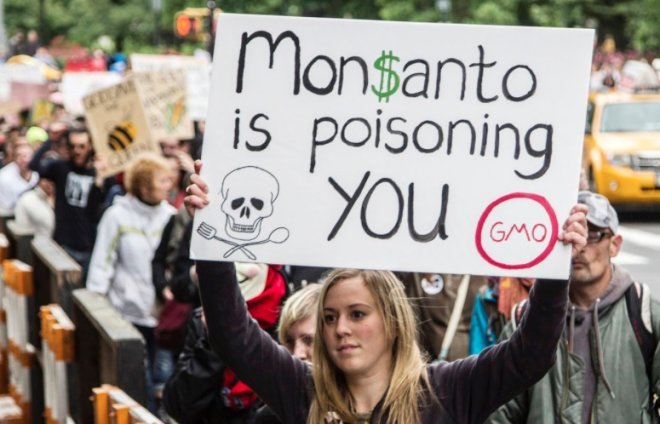Monsanto licensed the technology of gene editing CRISPR / Cas9

Greenhouses Monsanto in St. Louis. Photo: Stirton / Getty
Monsanto transnational corporation, the world leader in the production of genetically modified seeds and herbicides, did not pass by the promising CRISPR / Cas9 technology . The company quickly realized the commercial prospects of a new method of gene editing. On September 22, 2016, it became known that Monsanto licensed the CRISPR / Cas9 technology from the private Broad Institute of Harvard and MIT, famous for its research in the field of genomics.
With the help of CRISPR / Cas9, Monsanto is going to develop new varieties of crops, including maize and soybeans, that are even more resistant to diseases, pests and adverse weather conditions. Thanks to GMO cultures, there is hope that people will not die of hunger, even in the face of global climate change and an increasing population of the Earth.
CRISPR / Cas9
The peculiarity of the method of gene editing CRISPR / Cas9 is that the body, as it were, independently, using the natural mechanisms of the immune system, cuts out the wrong piece of DNA according to a tip from geneticists. Such changes in the genome of an organism can occur (and occur) as a result of natural evolution. It is impossible to determine from the result of gene editing whether it was made as a result of human intervention or a natural mutation.
')
Recently, Swedish geneticists have managed to convince regulators that plants are not officially recognized as genetically modified organisms in accordance with the requirements of the European Union, if they do not contain “foreign DNA”. Thus, the CRISPR / Cas9 genetic experiments and the cultivation of genetically modified plants using the CRISPR / Cas9 method are no longer prohibited in all EU countries . Monsanto hopes that the specific features of CRISPR / Cas9 will help to more widely apply this technology of gene editing, bypassing some of the limitations that are imposed on GMOs.
The CRISPR / Cas9 technique allows for precise DNA editing. It is more effective than the standard techniques of gene modification, and certainly an order of magnitude more efficient than the archaic methods of "blind" genome change using the selection method used in past centuries. Thanks to CRISPR / Cas9, scientists do not need to select for hundreds of generations to get the desired result — resistance to pests or the required food parameters.
GMO - the hope of mankind
“Increasing crop yields while reducing farmland is clearly critical to humanity,” explains Tom Adams, director of biotechnology at Monsanto. “And gene editing is another tool that will help us speed up this process.”
People for many years tried to bring vegetables and fruits with the desired characteristics. For example, to bring varieties of tomatoes and peppers that are resistant to viruses and fungi. Gene editing is a great tool for working with plant genes that are responsible for these properties.
The Broad Institute is a unique research center that lives on the donations of billionaire Eli Broad. The Science Center combines the clinical expertise of the Harvard’s Medical School (Harvard’s Medical School) with the academic and engineering sciences of the Massachusetts Institute of Technology and Harvard University. Since its founding in 2004, he has conducted large-scale research in the field of genomics and chemical biology, including large-scale screening of small molecules, deciphering the genome of DNA from various mammals and other genetic studies. CRISPR / Cas9 genome editing technology was also one of the areas of research at the Broad Institute.
The institute traditionally shares the results of its research with the scientific community and non-profit organizations. A non-exclusive agreement with Monsanto is generally the first time that an institution has issued a license for the commercial use of gene technology in agriculture.
The decision was not easy. He was long considered by the Institute ’s Ethics and Security Committee . Scientists considered such potential threats as the uncontrolled spread of genes (gene drive), when the corresponding DNA fragments quickly spread in the population. Another concern is that the corporation may use technology to make sterile plants, forcing farmers to buy their products annually.
To prevent this from happening, the Broad Institute put a number of conditions on the use of CRISPR / Cas9 technology . In particular, the intentional spread of genes in the population and the production of sterile plants are prohibited. In addition, certain types of modification of tobacco leaves are limited — such modifications that can increase the popularity of smoking (the ethics committee noted that smoking increases the risk of developing lung cancer by a factor of 25). It is allowed to edit the tobacco genome for scientific purposes and for the production of medical proteins.
Monsanto end
The name of the company "Monsanto" has become almost a household name among fanatical opponents of GMOs. A simple search on the Internet produces hundreds of cartoons mentioning the name of this transnational corporation. Hundreds of people go to rallies with posters where Monsanto is portrayed as a monster poisoning children. The company is also known for developing the herbicide that the US Army used during the Vietnam War - “Agent Orange” (Agent orange - orange agent).

Soon these people who hate Monsanto will be easier to live. Two weeks ago, the German concern Bayer announced the takeover of Monsanto for 58.7 billion euros , that is, at a price of $ 128 per share (+ 44% to the market price). The boards of directors of both companies unanimously approved the merger. By the way, this is the biggest deal in the history of the German economy .
The closing of the transaction is expected at the end of 2017 after the necessary checks by the regulatory authorities. It is assumed that the German concern can get rid of the brand "Monsanto" , which has such a bad reputation.
Of course, the disappearance of the Monsanto brand will not affect the distribution of GMO products. If regulators in 30 countries approve the merger, Bayer and Monsanto will jointly control about 30% of the global seed market.
Source: https://habr.com/ru/post/397733/
All Articles